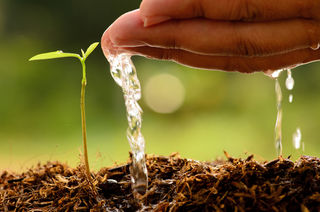Education
Transform Your Problems: 3 Lessons
Learning to face what you dislike can help you to flourish.
Posted July 11, 2018

I’ve always avoided watering my yard, outdoor plants, trees, anything. For decades (literally) my sprinklers have rested comfortably in the dust of my garage. My preconception of yard and tree watering was that it was tedious and uninteresting. So I always avoided it and kept my fingers crossed for rain.
That was true for all those years until this week. I planted two new trees and 11 bushes in my front and backyard. And, it’s the middle of summer in the midwestern U.S. heat. I suddenly had a new kind of choice: Water all the new additions every day or watch them wither and die. I dusted off the sprinkler, fidgeted for several minutes (which seemed like hours) to get it to work, dragged out the hoses, and began the watering.
This was a new habit I had to develop and one I needed to remember each morning or evening – regularly moving the sprinkler around to reach everything. After a couple days, something shifted in me. I really enjoy this. I began to appreciate the “life” I was helping to develop and flourish. I began to spend more time in my yard, walking around, appreciating the beauty, and imagining future plans for making it even greener and more peaceful.
I share this story with you for several reasons, all related to handling challenges: strengths-spotting practice; mindfulness with what we dislike; metaphor for flourishing. I’ll tackle each of these three now.
Strengths-spotting practice
Every story (yes, every story) is an opportunity for looking for and finding character strengths. Look to your positive high-point stories, your low-point stressful stories, and the mundane/boring stories of your life. All have character strengths resting in them to some degree. In my story, what strengths do you spot? What is the rationale for each strength you spotted?
When I re-examine the story (which is a good, personal positive activity, by the way), I see my hope strength of looking to the future in a positive way, I see appreciation of beauty for the greenness and the development of the plants, and I see self-regulation in having a discipline to establish a new habit on a schedule. When we examine a life challenge or problem using the lens of character strengths, we begin to transform the problem. Our mind begins to perceive it in a new way. This opens up new learning and growing opportunities for us.
Mindfulness for what we dislike
Harvard researcher/psychologist Ellen Langer once did an innovative study in which she randomly assigned people to either do an activity they disliked or to do an activity they disliked while focusing on three novel features of the disliked activity. For example, if a person chose vacuuming as the disliked activity then they might pay attention to the whirling sound of the vacuum cleaner, feeling the movement of the cleaner around sharp corners, and watching the dust swirl up. What she discovered is that those who did the disliked activity and were curious (noticing novel qualities of the task) ended up enjoying the activity more and doing the activity more on their own after the experiment concluded!
It’s easy to get locked into what we dislike – foods, places, work tasks, even people. But, what would happen if you challenged yourself to use mindful attention and curiosity to face it? This is the opposite of avoidance. It is mindfulness for what is real in the moment. When we face the difficulties directly, we begin to discover what we were missing all along. I was missing out on a lot of beauty, new yard developments, an inner joy, and positive experiences in my avoidance of yard watering.
Metaphor for flourishing
It’s hard to miss the metaphor of attending to something to help it to grow. I’m in the midst of attending to my bushes and trees to help them to grow and (hopefully) flourish. We can bring our mindful attention to our character strengths. This will help them to develop and grow. Character strengths research repeatedly shows a strong connection between these character strengths and a flourishing life. A life of high well-being.
Start with yourself: What you have been avoiding? How might you use your best strengths to discover something new about a challenging task, situation, or person?
References
Niemiec, R. M. (2014). Mindfulness and character strengths: A practical guide to flourishing. Boston: Hogrefe.
Langer, E. (1989). Mindfulness. Reading, MA: Addison-Wesley.


